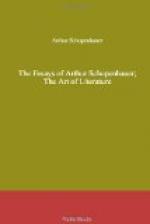ON GENIUS.
No difference of rank, position, or birth, is so great as the gulf that separates the countless millions who use their head only in the service of their belly, in other words, look upon it as an instrument of the will, and those very few and rare persons who have the courage to say: No! it is too good for that; my head shall be active only in its own service; it shall try to comprehend the wondrous and varied spectacle of this world, and then reproduce it in some form, whether as art or as literature, that may answer to my character as an individual. These are the truly noble, the real noblesse of the world. The others are serfs and go with the soil—glebae adscripti. Of course, I am here referring to those who have not only the courage, but also the call, and therefore the right, to order the head to quit the service of the will; with a result that proves the sacrifice to have been worth the making. In the case of those to whom all this can only partially apply, the gulf is not so wide; but even though their talent be small, so long as it is real, there will always be a sharp line of demarcation between them and the millions.[1]
[Footnote 1: The correct scale for adjusting the hierarchy of intelligences is furnished by the degree in which the mind takes merely individual or approaches universal views of things. The brute recognizes only the individual as such: its comprehension does not extend beyond the limits of the individual. But man reduces the individual to the general; herein lies the exercise of his reason; and the higher his intelligence reaches, the nearer do his general ideas approach the point at which they become universal.]
The works of fine art, poetry and philosophy produced by a nation are the outcome of the superfluous intellect existing in it.
For him who can understand aright—cum grano salis—the relation between the genius and the normal man may, perhaps, be best expressed as follows: A genius has a double intellect, one for himself and the service of his will; the other for the world, of which he becomes the mirror, in virtue of his purely objective attitude towards it. The work of art or poetry or philosophy produced by the genius is simply the result, or quintessence, of this contemplative attitude, elaborated according to certain technical rules.
The normal man, on the other hand, has only a single intellect, which may be called subjective by contrast with the objective intellect of genius. However acute this subjective intellect may be—and it exists in very various degrees of perfection—it is never on the same level with the double intellect of genius; just as the open chest notes of the human voice, however high, are essentially different from the falsetto notes. These, like the two upper octaves of the flute and the harmonics of the violin, are produced by the column of air dividing itself




